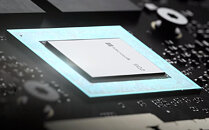Sunday, December 20th 2020

Microsoft is Engineering Custom Processors for Servers and Surface PCs
Designing a custom processor can be a rewarding thing. You can control your ecosystem surrounding it and get massive rewards in terms of application-specific performance uplift, or lower total cost of ownership. It seems like cloud providers have figured out that at their scale, designing a custom processor can get all of the above with the right amount of effort put into it. If you remember, in 2018, Amazon has announced its Graviton processor based on Arm instruction set architecture. Today, the company has almost 10% of its AWS instances based on the Graviton 1 or 2 processors, which is a massive win for a custom design.
Following Amazon's example, the next company to join the custom server processor race is going to be Microsoft. The Redmond based giant is looking to build a custom lineup of processors that are meant to satisfy Microsoft's most demanding sector - server space. The company's Azure arm is an important part where it has big and increasing revenue. By building a custom processor, it could satisfy the market needs better while delivering higher value. The sources of Bloomberg say that Microsoft is planning to use Arm ISA, and start building independence from the x86 vendors like Intel and AMD. Just like we saw with AWS, the industry cloud giants are starting to get silicon-independent and with their scale, they can drive the ecosystem surrounding the new processors forward rapidly. The sources are also speculating that the company is building custom processors for Surface PCs, and with Windows-on-Arm (WoA) project, Microsoft has laid the groundwork in that field as well.
Source:
Bloomberg
Following Amazon's example, the next company to join the custom server processor race is going to be Microsoft. The Redmond based giant is looking to build a custom lineup of processors that are meant to satisfy Microsoft's most demanding sector - server space. The company's Azure arm is an important part where it has big and increasing revenue. By building a custom processor, it could satisfy the market needs better while delivering higher value. The sources of Bloomberg say that Microsoft is planning to use Arm ISA, and start building independence from the x86 vendors like Intel and AMD. Just like we saw with AWS, the industry cloud giants are starting to get silicon-independent and with their scale, they can drive the ecosystem surrounding the new processors forward rapidly. The sources are also speculating that the company is building custom processors for Surface PCs, and with Windows-on-Arm (WoA) project, Microsoft has laid the groundwork in that field as well.

16 Comments on Microsoft is Engineering Custom Processors for Servers and Surface PCs
Not to mention, it appears that AMD is just as willing to jack up prices anyways. Good for the market to have alternative options, hopefully it will keep the greed in check.
Apple M1 is mighty impressive for their first SoC.
Especially how well it emulates Mac X86 apps and Windows version of Witcher 3.